After a divisive and bruising presidential election campaign Georgians now need to assess where that leaves their democracy and their country's political fabric, argues Dennis Sammut in this op-ed for commonspace.eu
Georgia has a new president. Salome Zurabishvili is the first women to be elected to the post by popular vote. And the last. From now on the person holding the largely ceremonial post will be chosen by parliament. The office of head od state in parliamentary republics, as Georgia is, often plays a unifying role for the nation and society. This is what will be expected from Zurabishvili. This will not be easy, for the election campaign has been bruising and divisive - a good reason perhaps why having an indirectly elected head of state is often justified.
Reflecting back on these elections one can draw some conclusions on the current state of Georgian politics.
(1) Not for the first time the Georgian electorate has emerged as more politically mature than the political elite that represents it. In essence, by not electing Zurabishvili in the first round, the Georgian electorate sent a clear message to the government and the ruling Georgian Dream (GD) party that it was not satisfied with its performance. The electorate was not however ready to send a signal to the opposition led by the United National Movement (UNM) that it was now their turn. Given a clear choice between a GD and a UNM candidate, many who had stayed away in the first round came out to vote in the second round, giving Zurabishvili a convincing win. Georgian voters have been largely unimpressed by the vitriolic language used in the campaign that has just ended
(2) This election, may have started as an exercise to elect a largely ceremonial head of state. But for those casting their vote in the second round, on 28 November, it was more than anything else a vote of confidence in Bidzina Ivanishvili, the founder and leader of the Georgian Dream party. An enigmatic figure who in 2012 emerged to front line politics to help push Mikheil Saakashvili and his increasingly authoritarian government out of power, Ivanishvili in 2013 tried to return back to the shadow, handing power to an inexperienced team, and trying to maintain influence from behind the scenes. Such subtleties do not work very well in Georgia's larger than life politics. Ivanishvili in May was forced back to front line politics in an effort to save the party that he founded from itself. In the last month he campaigned as if his name was on the ballot paper, not least because the opposition also wanted to turn the election into a vote of confidence in him. Wednesday's victory was therefore a victory for Bidzina Ivanishvili as much as it was for Salome Zurabishvili, if not more. Ivanishvili made some serious promises to the Georgian people in the last few weeks. The people trusted him again, as they did in 2012. He now cannot return back to the shadows, but needs to lead from the front to deliver. It seems that this is what he intends to do.
(3) For the opposition this election has been a defining moment. The United National Movement - the hybrid party constituted shortly after the changes in 2003 that saw Mikheil Saakashvili replace Eduard Shevardnadze as president could easily have disappeared after it lost power in 2012. In and out of government, the party often appeared to outsiders more as a sect rather than a modern political movement. In 2016 it split with the more moderate wing re-inventing itself as "European Georgia". But the party's grass root support, especially outside Tbilisi has endured. The second round of the presidential election saw the two factions coming back together in a "United Opposition", a platform joined by some other smaller groups. This election has confirmed that the UNM is back in the game. It is the alternative government in waiting that is necessary in any democracy. But for the UNM the journey back to power remains a long one. It still has credibility problems; the baggage of the past still looms large over its present, and its tactics still raise questions. The Georgian electorate has given a clear message to the UNM - it is ready to give them a chance, but not quite yet. Patience and perseverance are virtues the UNM needs to learn to embrace. Difficult for as long as the party is under the shadow of its former leader Mikheil Saakashvili, who yesterday within minutes of the election result being announced called for the opposition to move to the streets. Saakashvili has as yet to understand that if he wants to see a change of government in Georgia he needs to let go of the UNM and let a new team develop new tactics. What worked in 2003 is not going to work in 2018, and will certainly not work in 2020.
(4) Perhaps the most important take from this election is that the Georgian state institutions are now robust enough to survive political turmoil. This has been a bruising and unpleasant election campaign, full of personal attacks, mutual recriminations, fake news and other unpleasantness. Yet the Georgian election administration, and the thousands that participate in delivering a smooth and well organised election, acted largely with dignity and professionalism throughout. Yes there were weaknesses here and there, and the odd incident. But the big picture was overall positive, and that is good news for Georgia.
(5) Election watchdogs, such as ISFED and GYLA helped this process. The role of these and other NGOs is changing. They, and the rest of society must recognise that too. When they were set up in the 1990s the problem with Georgian elections were crude: ballot stuffing, carousel voting and other similar shenanigans. The challenges are now different and they need to rise to them. In doing so they are likely to open themselves to more criticism than they have been used to before and they need to get used to that too. But Georgian politicians should never underestimate the great contribution that civil society makes to the political fabric of a democratic country. Government and civil society in Georgia need now to turn the page and embark on a new dialogue.
Georgia's journey to democratic statehood has been long and often arduous. The 2018 presidential election has been a good opportunity to understand where the country is with that process and the state of health of the country's political fabric. Lessons need to be learned. But overall there should also be a measure of satisfaction that all the sacrifices of the past have not been in vain.
source: Dennis Sammut is Director of LINKS (Dialogue, Analysis and Research) and is based in Oxford. He has been an observer of the Georgian political scene since 1992 (dennis@links-dar.org)
photo: Georgian voters have been largely unimpressed by the vitriolic language used in the campaign






